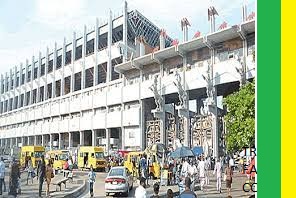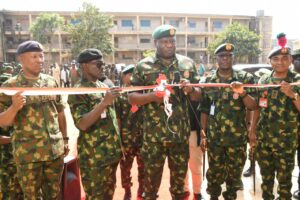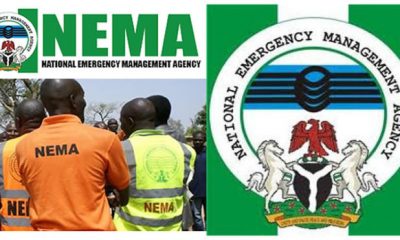Education
Bayelsa Proposing a 15-year Education Turnaround
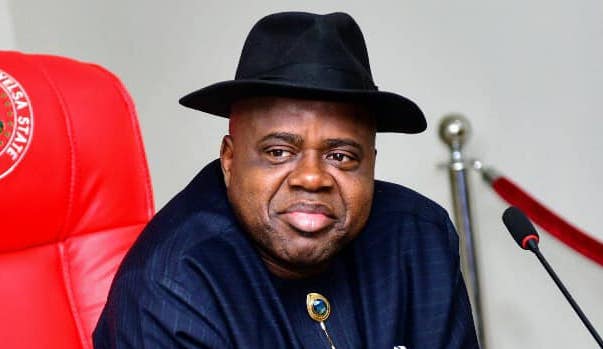
From Tayese Mike, Yenagoa
The Bayelsa State Government is planning an education summit to provide an appropriate and adequate education delivery system capable of continuously propelling the system to be functional, efficient, effective and goal driven.
The proposed summit has been described as an “all embracing education summit towards a 15-year plan and a domesticated state policy for sustainable, rapid and improved education delivery and development
.
” An interim report on the summit made available to DAILY ASSET in Yenagoa says “the quest is to establish an appropriate system that would accelerate development and peaceful coexistence in terms of scientific and economic advancement; productivity; socio-cultural and religious harmony and political stability.”Former President, Chief Olusegun Obasanjo is expected to chair the five-day summit in Yenagoa, the Bayelsa State capital while Dr Akinwumi Adesina, President of African Development Bank Group (AfDB) will be the keynote speaker at the event.
An 11-member summit technical committee was inaugurated to evaluate the current challenges in the educational sector in the state, especially with regards to declining outcomes, declining completion rates, poor infrastructure, teacher quality and distribution and new pathways in the delivery of education and provide the framework for hosting an education summit with the capacity to attract global institutions and partners in the field of education whose perspectives would help to shape the future of education delivery and development.
The committee has the state Commissioner for Education, Hon. Dr. Gentle Emelah as chairman, the Executive Secretary of Education Development Trust Fund (EDTF), Dr Mrs Alice Atuwo as co-chairman and the Executive Chairman, Teachers Training,
Registration and Certification Board (TTRCB), Dr Mrs Stella Peremoboere Ugolo as secretary. Other members include the Permanent Secretary, Ministry of Education, Mr Christopher Ewhrudjakpo, his predecessor, Mr Walton Liverpool, Prof Ebimieowei Etebu, a senior lecturer at the Niger Delta University (NDU) and board member, Science and Technical Education Board (STEB), Dr Crispin Allison, an education specialist.
Barr Warmate Jones Idikio, Director-General Yenagoa Chamber of Commerce Industry Mines and Agriculture (YECCIMA) who also serves as the summit administrator, Dr Jasper Ezenwaka, a lecturer at NDU, Queen Josephine Ezonbodor-Torru, former Commissioner for Education Commissioner and current Chairman, Bayelsa State Scholarship Board and Mr Ayedi Alexander of the EMIS Office in the Ministry of Education.
The interim report noted that desire of stakeholders for such a summit has crystalized into positive actions by the Prosperity Administration led by the state Governor, Senator Douye Diri and the Education Commissioner, Hon. Gentle Emelah to attain higher levels of success.
Both men committed themselves to ensuring that an embracing education summit be organised to stabilise the sector and improve upon the gains already made hence the ministry is initiating the summit which is the first of its kind in collaboration with other education organs.
The interim report also notes that Bayelsa State has “matured to the level of propagating and domesticating a wholesome education plan and policy to facilitate adequate education delivery to guarantee stability, continuity and perpetuity.”
Stressing that education is an input-process-output system, the report enumerated the four major determinants of a functional system that must be planned for: they are context, inputs, processes and outputs.
The major areas of focus for the summit are indicated to include education demand, provision and access; management and administration of the system; education funding and financing; infrastructural requirements and provision; supply, distribution and utilisation of personnel; and, quality control, quality assurance and curriculum.From the above, sub-10 themes were selected which include access to education; school administration; education financing; infrastructural situation, requirements and development; quality assurance and control; and, issues of curriculum.Others are establishment and management of higher institutions; establishment, administration and management of primary and secondary schools; minimum standards for teacher supply, distribution and utilisation in schools with regards to quantity, quality, speciality and experience; and, teacher emoluments, promotions, incentives, sanctions, discipline, retention and retirement.
All of these are expected to address the questions of context, key perspectives and challenges of educational development in the state, which include the conviction that education is “a must do” assignment in the state as it can maximise the prospects of a prosperous state.
However, though educational development has commenced in the state, the pace has been too slow due to a myriad of factors: there is also the issue of preponderance of unilateral engagements and projects initiations that are not in harmony with overall educational development objectives of the state.
According to the interim report, educational development and integration needed to be people centred with stronger partnerships with citizens, private sector players and civil society institutions to facilitate progress and sustainability.
Education is actually seen as the most valuable strategy to galvanise the youth, which is the most prized asset of the state and the summit is, therefore, expected to “advocate for and provide clear policy guidance based on research and best practices for a stronger partnership for faster inclusive education and integration in all dimensions.”
No doubt, the issue of educational development in Bayelsa State is challenging especially as the state has to strive to do catch up with other states in so short a time; at the time of creation in 1996, Bayelsa, though having primary and secondary schools, had no tertiary institutions hence her classification as an educationally backward state.
The state of education could also explain the prevalence of illiteracy, ignorance, poverty, militancy, cultism, child pregnancy, unemployment, underemployment, low per capita income, lack of sufficient and skilled manpower, disease, increased death rate, low life expectancy and poor infrastructure outlay, the interim report stated.
However, within the past 25 years, successive governments have worked according to their abilities so that the state now boasts of 547 public primary schools with 120,000 enrolment, 195 public secondary schools with 85,000 enrolment and seven higher institutions including three universities – Niger Delta University (NDU), Amassoma, University of Africa, Toru-Orua and Bayelsa Medical University, Yenagoa.
The other tertiary institutions are the Isaac Jasper Boro College of Education, Sagbama, Bayelsa State Polytechnic, Aleibiri, College of Nursing and Midwifery, Tombia, School of Tourism and Hospitality, Yenagoa and the School of Health Technology, Otuogidi.
Currently, there are eleven (11) functional free boarding secondary schools, one located in each of the eight (8) local government areas with total student population of over 5,000 have been established just as many Bayelsans have benefitted from undergraduate and graduate scholarships within Nigeria and overseas.
The state government has established relevant organs to strengthen the operations of the system such as the Education Development Trust Fund (EDTF), Teachers Training Registration and Certification Board (TTRCB), Science and Technical Education Board (STEB), Directorate of Inspection and students loan board.
In spite of the above, much remains to be achieved, therefore, concept of the summit is to provide an integrated platform and opportunity for government institutions, educationists, stakeholders and development partners to work in synergy to develop an 15-year educational plan and establish a state education policy to guide management and strategic implementation of educational policies.
The result will help to spell out in clear terms the philosophy, aims and objectives of education delivery to guide decisions and actions as well as stipulate standards, rules, regulations, guidelines and specifications for the establishment, running and administration of schools.
It will further help to determine parameters for enrolment of pupils and students into schools including decisions for grade and level transition through the system and also assist in systemically identifying curriculum needs and adapt or adopt an innovative, indigenous and desired curriculum.
It is also hoped that the outcomes of the summit will define, in a structured manner, the requirements for employment and engagement of staff from entry point to retirement and specify the modes and means of funding, streamline the functions, assignments, roles and duties of all education organs and their personnel as well as delineate means, modes and schedules for periodic assessment and appraisal of the system.From the foregoing, it is expected that there will overall improvement of students’ performance at all levels and there will be increase in their transition to tertiary institutions while they will graduate with “sufficient capacity, skills and competences to promote creativity, productivity, entrepreneurship and statesmanship.”
The organisers are convinced that the outcome of the summit will transcend education due the multiplier effect it will have on the Bayelsa society and therefore position the state to greatness.
According to the report, “ultimately, the overriding rationale and justification for the summit transcends schooling activities and outcomes as the revived education system will yield a multiplier effect that would position the state to tread the enviable path of: real and sustained economic growth, development and wealth creation; increase per capita income; and provide sustainable peace and stability.”
More specifically, improved operational systems of governance at the macro, strategic and operational levels will be attained in political leadership, and the public/civil service leading to: improved social services including utilities such as roads, energy, healthcare, individual wellbeing, increased life expectancy, controlled population growth; better recreation and tourism opportunities; improved transportation and communication systems with respect to use of ICT, electronic and the internet in their diverse path ways; increased awareness for self-worth, dignity, self-actualization, desire for productive labour and mutual respect for one another; the evolvement of better ways of crime detection and control that would decrease crime rate, strife, restiveness, drug use and abuse.”
With skilled manpower, there would be increases in creativity, commerce and industry, mechanised agriculture, scientific and technological breakthroughs, and industrialisation.
This will afford the state the capacity to strive, compete, be at par, or overtake more developed settings to take its rightful position in the comity of nations in every sphere desired.”
Education
Education, key to Changing Nigeria, says NTI D-G
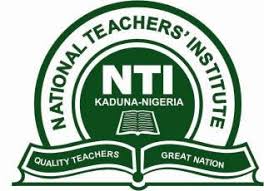
Prof. Sadiya Sani-Daura, Director-General, National Teachers’ Institute (NTI), Kaduna, says education is key to changing and transforming Nigeria in all ramifications.
Report says that she spoke on Wednesday in Kaduna while declaring open nationwide training workshops for 222 basic school teachers drawn from across Nigeria.
The five-day training is also focusing on E-learning, climate literacy and green life skills.
The training is taking place simultaneously in Kaduna and Lagos, with the participants drawn from the 26 states and FCT.
It has as its theme, ‘Digital Pedagogy, Remote Learning, E-Learning, Climate Literacy and Green Life Skills.’
The training was organised by the Institute in collaboration with the Universal Basic Commission (UBEC).
She said, “With the right attention given to the education sector, a lot of the negative narratives in Nigeria will change for the better.
” A lot of things went wrong hitherto because education was not getting the desired attention.
“With education getting the desired attention, everything will change, including combating criminality.
“It is however gladdening that the present administration of President Bola Tinubu is unwaveringly committed to redressing the obnoxious situation.”
The director-general further reiterated the unwavering commitment and dedication of the Institute to teacher training and development.
According to her, NTI will remain steadfast in making the Nigerian teachers globally competitive,hence helping to restore the lost global glory of the nation.
Sani-Daura, said they represent a milestone in the collective effort to advance teacher education and strengthen the foundations of basic education in the country.
She said that NTI, in collaboration with UBEC has consistently championed innovative strategies to equip the teachers with the skills and knowledge required to address the evolving demands of modern education.
Sani-Daura said, “Today’s workshops reflect this commitment, providing an avenue for professional development that aligns with global best practices and national priorities.
“The first focus area, which is digital pedagogy, remote teaching and e-learning, comes at a time when technology has become an integral part of the teaching and learning process.
“Teachers must be empowered with the tools and skills to harness the potential of digital platforms to enhance instruction, engage learners and foster critical thinking.
“This training is expected to bridge the gap between traditional teaching methods and the emerging trends in education technology as well as prepare the teachers to thrive in the digital age.”
On climate literacy and green life skills, the director-general decried that the world was grappling with the effects of climate change, saying, “our responsibility as educators goes beyond academics.
“Teachers play a critical role in shaping attitudes and behaviours that promote environmental sustainability.
In a welcome address, Dr Bature Salisu, Special Technical Assistant to the director-general, said that the collaboration between NTI and UBEC underscored the shared vision and partnership to advance teacher education.
He said, “This initiative is a testament to the NTI’s unwavering commitment in enhancing the professional capacity of teachers and addressing contemporary educational challenges.”
According to Salisu, the training reflects a collective resolve to equip teachers with innovative teaching methodologies and critical life skills to prepare students for the demands of the 21st century.
The acting Registrar of the Institute, Mrs Zainab Aliyu, described the theme as apt and timely.
She stressed that Nigerian teachers must not lag behind, urging them to be creative using technology.
The teachers attending the workshop at Kaduna were drawn from all the Northern states and FCT while the participants at the Lagos centre were drawn from all the Southern states. (NAN)
Education
Private School Operators Deny Charging Exorbitant Fees, Hiring Unqualified Teachers
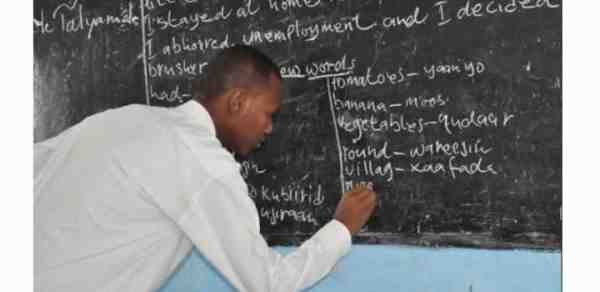
Some owners of private schools in the South-South region say they only charge school fees that are commensurate with the quality of service being offered.The private school owners made the expression during a News Agency of Nigeria (NAN) survey in Akwa Ibom, Cross River and Rivers.Mr Godwin Okwu, the Chairman, National Association of Proprietors of Private Schools, (NAPPS), Cross River chapter, said that the fees charged by private school in the state were not exorbitant.
Okwu further said that it was untrue that private schools employed unqualified teachers. “Whatever we charge as school fees is commensurate with the quality of service we provide.“Private schools may look expensive, this is because the government does not subsidise their services the way they do for public schools.“In some public schools, the government pays for everything including staff, and still collect fees from the students,” he said.He said it was wrong and unfair to compare the public school system to the private school system in terms of fees because public schools enjoyed the full support of government.“What we should consider is the quality of service and the product. It is not in doubt that the private school system is producing better results.“So it is unfair and contradictory to say that private schools employ substandard teachers, how then are we able to produce good results if our teachers are of low quality?” he said.The NAPPS chairman however said that private school owners were sometimes forced by economic realities to carry out minimal increase in fees.“Currently, the minimum wage for workers has increased, and private schools are expected to pay. How else do we raise the money to pay salaries?Okwu urged the state ministries of education to be more proactive and thorough in undertaking their inspectorate and monitoring functions.“As the regulator, the ministry should ensure uprightness. The interest of the children should be in the forefront,” he said.On his part, Mr Daniel Effiong, a Director of Inspection in Cross River Ministry of Education, said it was misleading to say that private schools employed low quality teachers.He said that the ministry had been resilient in monitoring the activities of private schools in the state.“We check the qualifications of the teachers, the environment, toilets among others before approval and upgrading.“This exercise is not just once, we do it regularly. Surely there are bad eggs in the system, we penalise them when they are uncovered,” he said.Also speaking on the issue, Mr Ubokmfon Williams, NAPPS Chairman in Akwa Ibom, said that private school owners in the state had not increased fees in a long time.Williams said that the economic situation in the country had made it difficult for private school owners to increase school fees.“With the way the economy is, any unnecessary increment in school fees may lead to massive withdrawal of students.“If you understand school business, if you truly want to remain in business, you have to avoid unnecessary increase in fees,” he said.The NAPPS chairman however said that sometimes, economic realities force private owners to increase fees in order to meet up.“Take salary as an example, if you don’t increase fees, how do you pay salaries of your workers. When you can’t pay salaries, your employees will go elsewhere.“As private school operators, we look critically at the interest of parents and the economic situation in the country before taking decisions.“We also want to remain in business, we are aware that the priority of every parent at the moment is food. We are very careful not to lose our market,” he said.Speaking on the reason private schools do not have uniform school fees, Williams said that criteria such as location and quality of service are considered by schools before fixing their fees.“Some schools pay for excursions, school bus, medicals, security, and some schools are located far away from town.“One thing is that no private school unilaterally fixes school fees, every private school liaises with its Parents Teacher Association before deciding what the fees will be,” he said.Speaking on the quality of services being offered by private schools, the NAPPS chairman, said that private schools did not treat the issue of teachers qualification with levity.“We hire not just good and professional teachers, we ensure that our teachers posses the skills to impart knowledge.“We are aware that a teacher may be a professional but may not skillful, so in the private school system, we are goal oriented,” he said.Mr Assam Abia, an Eket-based parent whose children are in private schools, said that more families took interest in sending their children and wards to private schools because the public school system failed at some point.“Parents are only seeing the fees charged by private schools as exorbitant because of the current economic challenges.“What I see is that school proprietors are responding to the basic economic law of demand and supply by increasing their fees,” he said.He said that the employment situation in the country had left many graduates without jobs, and that those who did not train to become teachers were now working as teachers.“Private schools are in business, they must make profits. The remedy lies in the monitoring agencies to do their jobs effectively.“The ministry or department that supervises private school should be more thorough and proactive, we want to see them in action,” he said.Abia also called for an overhaul of the education sector through legal and policy frameworks that would put the sector on the right track.“There is an urgent need for the Federal Government to declare a state of emergency in the education sector. Governments need to pay attention to the activities of private schools.In Rivers, a Legal Expert, Dr Hilda Desmond, blamed the fees being charged by private schools on the lack of supervision by regulatory authorities.Desmond, the Chairman, Nigerian Bar Association, Ahoada Chapter, said that poor regulation and supervision of private schools had negatively affected primary and secondary school education in the state.“The education sector has been grossly bastardized particularly by private operators. Private operators exploit parents without making efforts to step up operational standards.“What we call exorbitant fee is purely class driven. Some elite see high school fees as a sign of quality, and prefer to enroll their children in such schools.“It is a matter of choice, here are still schools with qualified teachers, affordable school fees and appreciable learning environment,” she said.The lawyer expressed concerns that some schools greedily converted child minders to classroom teachers and pay meagre salaries.She said that it was an act of wickedness for school operators to use poor quality teachers at the nursery and primary school levels.“Once there is a faulty nursery and primary education, the entire learning process of the child becomes ruined. So we must strive to get it right from the first stage.”Sadly, most private schools are in business, rather than employ qualified teachers that should impart knowledge, they compromise examination standards,” she said.Mr Isijana Adasi, a Port Harcourt-based Education Consultant, said that all tiers of government had failed to provide the atmosphere for quality education to thrive.Adasi, also the Lead Advisor, Adasi Science Project, identified inadequate budgetary provisions for education as a major reason for the inefficiency in supervision and monitoring of the private school system in the country.“This is part of the reasons that education inspectors have become vulnerable, and are now compromising standards.”Most school inspectors visit high profile schools with the mindset of receiving money and other packages without being thorough about their duties.“So, until regulatory authorities become committed to their duty of enforcing standards, the average Nigerian child may not get the best education, it does not matter how much parents pay as fees.Mr Isaiah Uwa, a Bori-based parent, urged the Federal Government to take more stringent steps towards improving the quality of service being offered by private schools.“Part of the efforts should also be to monitor what they charge as school fees. Quality and standard should be the primary consideration.“Some private schools claim to adopt British or American curriculum instead of the government approved curriculum. This shouldn’t be allowed.“Some of these schools make their pupils to skip classes and some statutory examinations, this is a gross disservice to the society,” he said.(NANEducation
Varsity Don Highlights Opportunities for Benue Economic Growth
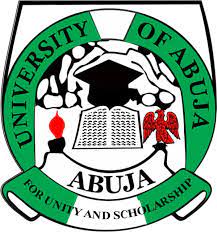
By David Torough, Abuja
Dean of the School of Postgraduate Studies at the University of Abuja, Professor Ukertor Gabriel Moti, has said Benue State’s economy remains a paradox of vast potential and persistent poverty.Speaking at the maiden reunion and award ceremony of Club De Pals held in Abuja, Prof.
Moti outlined key issues affecting the state’s economic performance and suggested pathways for growth. “Benue is rich in agricultural produce and natural resources, yet it struggles with poverty, unemployment, and weak fiscal performance,” he stated, adding that the state’s reliance on federal allocations was unsustainable. Moti added that the state’s Gross Domestic Product (GDP) stands at N4.27 trillion, ranking 12th in the country, but its Internally Generated Revenue (IGR) averages just N1.59 billion per month, making Benue heavily dependent on Federation Account Allocation Committee (FAAC) funds.“In 2022, Benue was the fourth most FAAC-dependent state in Nigeria, which is a dangerous position for poverty reduction efforts,” Prof. Moti said. He noted that 75% of the population is classified as dimensionally poor, with inadequate access to essential services such as health, education, and decent living conditions.Insecurity was identified as a major factor hindering economic development in the state, affecting agriculture and discouraging investments. “Insecurity has cast a long shadow over Benue, forcing the closure of markets like the Zaki Biam international yam market,” he remarked.Prof. Moti highlighted several strategies to rebuild the Benue economy, including prioritizing infrastructure development, creating favourable tax policies, and improving electricity supply through public-private partnerships.“The government must focus on agro-processing, industrialization, and creating a conducive environment for businesses. A strong partnership between the government, private sector, and civil society is essential for sustainable growth,” he said.He also urged civil society organizations like Club De Pals and local entrepreneurs to invest in small-scale ventures, noting that collective efforts were critical to achieving economic recovery.“Rebuilding the Benue economy requires deliberate and sustained action. It is a shared responsibility that must involve everyone,” Prof. Moti stated.
















